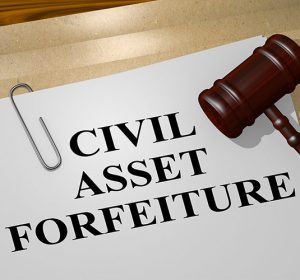Arizona Forfeiture Attorney
Believe it or not, you don’t have to be a criminal for the police to take and keep your property. It doesn’t matter if your cash is found in your luggage, stored in a safe, or even at your bank. It also doesn’t require you be charged with a crime. For the police to take your property, it simply requires an officer to believe that you, at some unknown point in the future; or even the past, intended to use the money/property to commit a crime. Such seizures are frequently justified by claiming that the property owner appeared “suspicious” or “nervous”, and therefore, the officer knew a drug transaction was imminent.
If your property has been seized, you should contact an attorney as soon as possible. Arizona forfeitures are extremely time-sensitive, and any delay may result in the forfeiture of your property.
Background: Forfeiture Actions are “Civil” in Nature

Asset forfeitures are a unique area of law; they are technically based on the property (not the person) violating a criminal offense that subjects it to forfeiture, which is prosecuted in a civil court, not criminal. Since a forfeiture action involves the taking of property—and not life or liberty—only the property owner’s economic interests receive protection under our constitutions. For example, the property owner must receive notice and an opportunity to challenge the forfeiture (5th & 14th Amendments), but it is less clear whether the State can keep property that it illegally seizes (4th Amendment).
Civil Asset Forfeiture
The Civil Asset Forfeiture laws on the books today were originally enacted as part of the War on Drugs, and for the purpose of taking the ill-gotten gains away from large drug kingpins and their organizations. But in recent years, these laws have been the focus of tremendous public outcry, as many innocent people continue to lose their property to overzealous law enforcement.
The root of their zeal is because law enforcement directly profit from taking people’s property. In Arizona, the seizing police department keeps 70% of their forfeitures, which pays for their overtime, retirement and new SWAT toys. Between 2011 and 2015, Maricopa County alone made over $88 million from forfeitures, sometimes from seizures less than $1,000. See Profits of Policing.
But on April 14, 2017, the Arizona legislature took a serious step towards reducing forfeiture overreach. Property owners are now given a fighting chance to obtain the release of their property seized for forfeiture by raising the burden of proof and promoting the assistance of an attorney. However, Arizona’s forfeiture laws still contain several nuances to that cause the automatic forfeiture of one’s property, which many attorneys frequently overlook. For property owners confronted with a seizure, contact an experienced criminal lawyer familiar with asset forfeitures as quickly as possible.
If the police have seized your property – do not ignore the mail! Once your property is taken, and the State intends to pursue its forfeiture, the State will provide notice—to any “interested person”—of its intent to pursue forfeiture. Many times the initial notice is served at the time of the seizure, but not always. Other times, it is served by Certified Mail only, so be sure to follow up with any Notification Cards left in your mailbox.
TWO IMPORTANT CIVIL FORFEITURE NOTICES:
A common problem that arises after the property is seized is waiting around for the State to bring a forfeiture action. In Arizona, the State has seven years to initiate forfeiture, but the property owner can demand the property’s release at any time. However, if the State serves a “Notice of Seizure for Forfeiture” (NOSF) the property owner must follow the statutes to claim the property.

If a property owner has not been charged with a crime, but their property was still seized; they have a valid basis to demand the immediate return of their property from the seizing officer. Otherwise, the State usually asserts a valid reason to continue holding the property. Although these requests are largely ignored, a written demand for the immediate release of seized property can be helpful later on.
After seizing property, depending on whether or not a crime is being charged, the State can either initiate forfeiture immediately or continue a criminal investigation. In some cases, its “investigation” can take years after property has been seized. But in cases where a DPS officer seizes someone’s property, the officer frequently serves the first notice upon the property owner at the time of seizure. Other agencies tend to wait for the county attorney’s office to serve the first notice.
1) Notice of Seizure for Forfeiture,
The first notice that property has been seized for forfeiture is the “Notice of Seizure for Forfeiture” (“NOSF”). This notice is either provided by the police officer at the time of asset seizure; or by the State’s attorney within seven years of the seizure. In either event, the NOSF starts the forfeiture clock; which requires the State to initiate forfeiture within 60 days of asserting the property was seized for forfeiture. When the seizing officer serves the NOSF; and the State fails to initiate forfeiture proceedings; the property owner is entitled to the immediate release of their property. [In re $3,636.24, 198 Ariz. 504, 11 P.3d 1043 (Ct. App. 2000).]
The first deadline implicated by the NOSF is the property owner’s right to request a hearing on the sole issue of whether probable cause then exists to believe the property is subject to forfeiture. This request must comply with the requirements of A.R.S. §13-4311(E) and (F); and served within 15 days of the NOSF. This hearing is the first step to challenging the forfeiture action. It is also the first opportunity to hear the seizing officer testify about the probable cause to believe the property is subject to forfeiture.
2) Notice of Pending Forfeiture.
When the NOSF is not served upon the property owner at the time of seizure, it is often served by certified mail by the State’s attorney. The Arizona forfeiture laws do not require the property owner to respond to the NOSF; but they “may.”
However, when the State’s attorney serves the NOSF, it usually accompanies the second notice; the “Notice of Pending Forfeiture” (“NOPF”).
Unlike the NOSF, the NOPF requires the property owner to respond, and quickly. Careful attention must be provided to the date of “service”; since it is not the date the property owner receives the notice, but the date placed in the mail. Due to the time-sensitive nature of civil forfeiture proceedings, it’s important to contact an asset forfeiture lawyer immediately
Notice of Pending Forfeiture
The State will usually commence forfeiture by serving a Notice of Pending Forfeiture. However, the State can also commence forfeiture by filing a complaint or information with the court. As soon as you receive a Notice of Pending Forfeiture, you must act quickly.
Filing a Claim
The property owner has thirty (30) days to file a “Verified Claim” demonstrating ownership to the property. The court is precluded from allowing any extensions of time to file the claim. The claim of ownership must comply with the requirements of A.R.S. §13-4311 (E)-(F). The claim must be served to the seizing agency and the attorney for the State. Depending on the specific facts of each case, the claimant must be careful to avoid exposing themselves to unnecessary criminal liability. Assistance from an experienced asset forfeiture lawyer is critical.
Once a claim has been filed, the property owner becomes a “Claimant”; and has acquired standing to challenge the forfeiture. Similar pitfalls, as well as other complications, are also associated with the next step in the litigation; e.g. filing an Answer to the State’s Complaint.
Retaining an Arizona Forfeiture Attorney
The new forfeiture laws in Arizona promote hiring a civil forfeiture attorney to defend you in a forfeiture action. For someone innocent of a crime, and victim to an overzealous police officer, hire an asset forfeiture attorney. If you prevail, Arizona law requires the State to pay your legal fees, as well as treble damages. This allows our legal team to defend innocent property owners with little-to-no out-of-pocket fees for their legal expenses.
Arizona forfeiture law is a complicated area of law that continues to evolve.Had your property unlawfully seized for forfeiture? Make one call, that’s all for a qualified forfeiture attorney to represent you in getting your property back. If you’ve been charged with a crime on connection with the forfeiture, contact the criminal defense lawyers with the Lerner and Rowe Law Group at (602) 667-7777. Due to the changes in the law, some cases do not require advance payment for the attorney’s representation.

